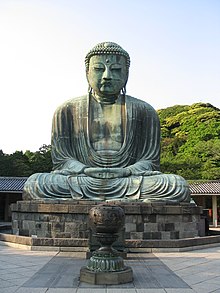You are currently logged-out. You can log-in or create an account to see more talks, save favorites, and more. more info
Buddhism Talks

Buddhism, also known as Buddhadharma and Dharmavinaya, is an Indian religion and philosophy based on teachings attributed to the Buddha, a wandering ascetic and religious teacher who lived in the 6th or 5th century BCE. It is the world's fourth-largest religion, with about 320 million followers, known as Buddhists, who comprise 4.1% of the global population. It arose in the eastern Gangetic plain as a śramaṇa movement in the 5th century BCE, and gradually spread throughout much of Asia. Buddhism has subsequently played a major role in Asian culture and spirituality, eventually spreading to the West in the 20th century.
According to tradition, the Buddha instructed his followers in a path of development which leads to awakening and full liberation from dukkha (lit. 'suffering'; 'unease', 'unsatisfactoriness'). He regarded this path as a Middle Way between asceticism and sensual indulgence, and the extremes of eternalism and nihilism. Teaching that dukkha arises alongside attachment or clinging, the Buddha advised meditation practices and ethical precepts rooted in non-harming. Widely observed teachings include the Four Noble Truths, the Noble Eightfold Path, and the doctrines of dependent origination, karma, and the three marks of existence. Other commonly observed elements include the Triple Gem, the taking of monastic vows, and the cultivation of perfections (pāramitā).
The Buddhist canon is vast, with philosophical traditions and many different textual collections in different languages (such as Sanskrit, Pali, Tibetan, and Chinese). Buddhist schools vary in their interpretation of the paths to liberation (mārga) as well as the relative importance and "canonicity" assigned to various Buddhist texts, and their specific teachings and practices. Two major extant branches of Buddhism are generally recognised by scholars: Theravāda (lit. 'School of the Elders') and Mahāyāna (lit. 'Great Vehicle'). The Theravada tradition emphasises the attainment of nirvāṇa (lit. 'extinguishing') as a means of transcending the individual self and ending the cycle of death and rebirth (saṃsāra), while the Mahayana tradition emphasises the Bodhisattva ideal, in which one works for the liberation of all sentient beings. Additionally, Vajrayāna (lit. 'Indestructible Vehicle'), a body of teachings incorporating esoteric tantric techniques, may be viewed as a separate branch or tradition within Mahāyāna.
The Theravāda branch has a widespread following in Sri Lanka as well as in Southeast Asia, namely Myanmar, Thailand, Laos, and Cambodia. The Mahāyāna branch, which includes the East Asian traditions of Tiantai, Chan, Pure Land, Zen, Nichiren, and Tendai , is predominantly practised in Nepal, Bhutan, China, Malaysia, Vietnam, Taiwan, Korea, and Japan. Tibetan Buddhism, a form of Vajrayāna, is practised in the Himalayan states as well as in Mongolia and Russian Kalmykia and Tuva. Japanese Shingon also preserves the Vajrayana tradition as transmitted to China. Historically, until the early 2nd millennium, Buddhism was widely practised in the Indian subcontinent before declining there; it also had a foothold to some extent elsewhere in Asia, namely Afghanistan, Turkmenistan, Uzbekistan, and Tajikistan.
| Title | Speaker | |
|---|---|---|
Sesshin LectureSerial: SF-05586B 71 #9 lecture continued Buddhism, Practice, Buddha |
Feb 08 1971 Unknown |
|
Lotus Sutra, Lecture No. II-1Serial: SF-05681 [Second Lotus Sutra series in 1968] Lotus Sutra, Buddha, Nirmanakaya, Buddhism |
Oct 20 1968 Tassajara |
|
We Are Not PerfectSerial: SF-05080A Sesshin talk. At the beginning, Suzuki Roshi is drawing from Dogen's "Bodhisattva's Four Methods of Guidance." The methods are also in Shushogi. Sesshin, Bodhisattva, Shushogi, Buddha Mind, Buddhism, Buddha |
Jul 23 1966 Sokoji |
|
Sesshin LectureSerial: SF-05428 TS-65-08-01 Bodhidharma, Time, Buddhism |
Aug 01 1965 Sokoji |
|
Sesshin LectureSerial: SF-05102 Tape X side 1 - Sunday lectures of Bishop Sumi Bodhidharma, Buddhism, Buddha |
Aug 01 1965 Sokoji |
|
Buddhism: Crossing Cultures, Evolving PracticeSerial: SF-05079B Lecture that was recorded over for 05079-A Buddhism, Japan, Priest |
1965 Sokoji |
|
Buddhism's Journey: East to WestSerial: SF-05424 PM-65-00-00 Buddhism, Japan, Priest |
1965 Sokoji |
|
Buddhism and Psychotherapy Practice, Buddhism, Buddha |
|
|
Buddhism at Millennium's Edge - Seminar 4Serial: SF-03514 Copyright 1998 by Gary Snyder - Unedited Preview Cassette Buddhism, Sangha, Time |
|
|
The Fourth Precept Buddhism, Sangha, Time |
|
|
The Seventh Precept Time, Practice, Buddhism |
|
|
The Eighth PreceptSerial: SF-04088 Side A and Side B and continued on the next tape Buddhism, Precepts, Time |
|
|
Death and Rebirth Part 2Serial: SF-03029A #6 Buddhism, Buddha, Time |
|
|
Yogacara SchoolSerial: SF-03031B #10 Buddhism, Buddha, Consciousness |
|
|
The Eighth Precept Buddhism, Time, Practice |
|
|
Second Precept Buddhism, Karma, Buddha |
|
|
First Precept Precepts, Buddhism, Community |
|